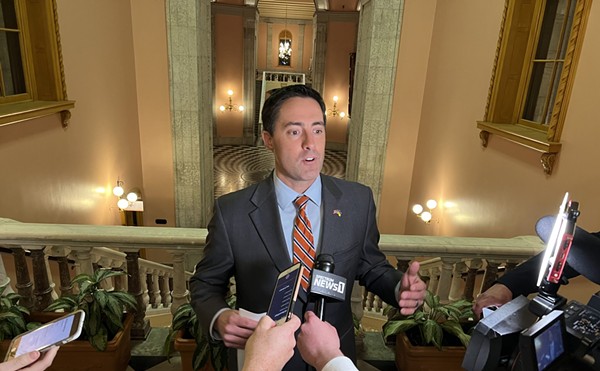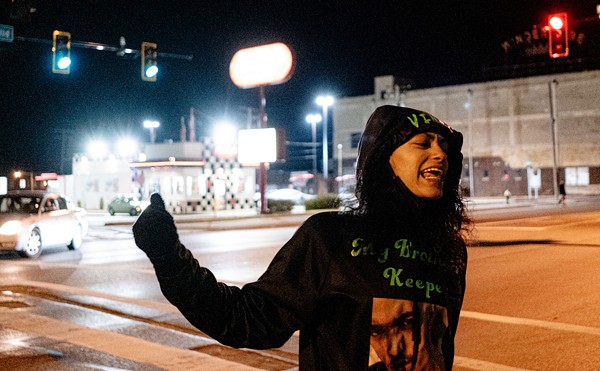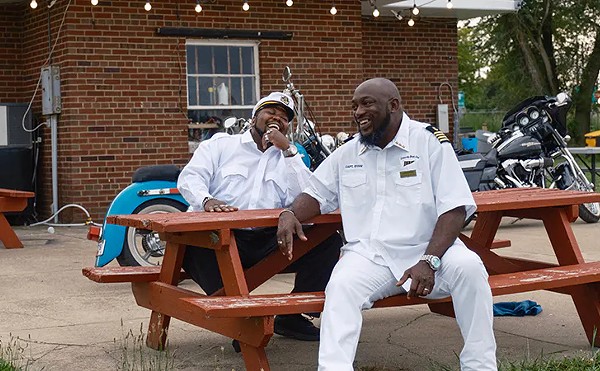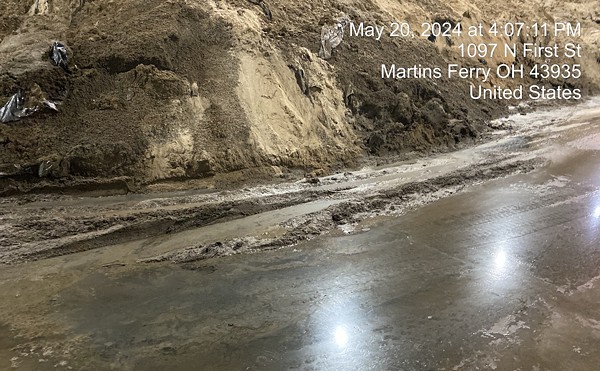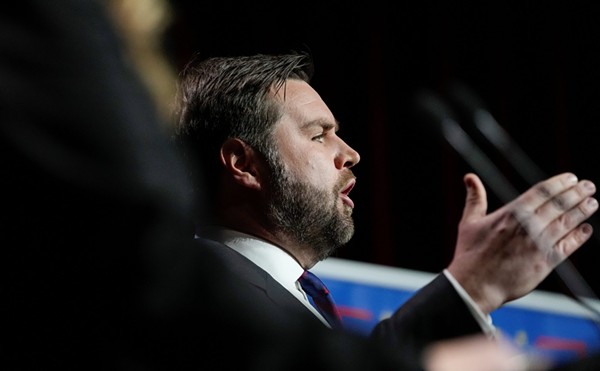"If you know Don Schulz," says Dr. Sami Hajjar, a colleague of 25 years, "he is the absent-minded professor who is totally fixated on his research."
The Cleveland State professor is an expert on U.S.-Latin American relations and has been quoted in newspapers coast to coast. But he's usually just a name midway through a story. The books and articles he writes take up but a few inches on library shelves or are swallowed by academic journals that are passed around by the same handful of specialists with the appetite and expertise to read them. It's a fulfilling if somewhat inconsequential existence.
"I'm a scholar, and scholars, almost by definition, are obscure," Schulz admits. "Nobody reads what we write -- except other scholars. It's very rare that you will have any effect whatsoever. And I suppose we're lulled into a certain sense of safety."
It was a surprise, then, when in April of last year, the recently appointed chairman of Cleveland State's Political Science Department received a foreboding note from Ricardo Cedillo, a lawyer for the Hank family.
Schulz knew enough about Mexican politics to be scared. In Mexico, "Hank" isn't the name of the friendly neighborhood mechanic; Hank means power, wealth, mystery.
Carlos Hank Gonzalez, the family patriarch, is commonly referred to as a "godfather" of Mexican politics. His two sons -- Carlos Hank Rhon and Jorge Hank Rhon -- control the family's vast corporate empire, which ranges from telecommunications to heavy industry, banks to racetracks.
In some circles, however, the Hanks are known as more than good sons of commerce. Schulz had seen a draft of a U.S. government report that accused the family of having illicit business partnerships with some of the world's most infamous drug smugglers.
So Schulz was curious to see why the lawyer was writing to him. In his letter, Cedillo asked whether Schulz was conspiring with two men -- Christopher Whalen of New York and Walker Todd of Chagrin Falls -- to plot the Hank family's demise. He asked about an odious government report, known as Operation White Tiger, in which investigators drew links between the Hanks and Mexico's drug cartels. Cedillo concluded the letter by requesting the "opportunity to meet with you to discuss . . . why my client, Carlos Hank Rhon, shouldn't sue you for damages you have caused him."
Schulz did not reply to the letter, believing the allegations misguided if not foolhardy. Four months later, he was served with a multimillion-dollar civil suit accusing him of invasion of privacy, racketeering, defamation, and tortious interference with a Hank-owned bank.
Judging by the suit, the Hank camp doesn't believe Schulz to be an innocuous professor. They see him as a sophisticated saboteur who has burrowed into government intelligence agencies and manipulated them to devious ends. His objective: to tar the Hank name, paralyze the family's U.S. businesses, and erode its power in Mexico.
Schulz says the notion of him as a conspirator is so farcical, it's almost hard to take seriously. Nine months into it, however, he's realizing the threat is real.
There's no rap sheet that says the Hanks are political fixers, drug traffickers, or assassins, as news stories have cast them. And that's not because the family has avoided investigation. Insight magazine, a weekly published by The Washington Times, claims a dozen or so probes by U.S. and Mexican law enforcement haven't managed a single criminal charge.
Yet the North American media have not been kind to the family. The boldest articles compare the Hanks to the Corleones and Al Capone. The tamest chronicle circumstances that seem hard to explain, implying corruption or foul play.
The Washington Post, for instance, once noted that Carlos Hank Gonzalez, now 74, retired with a fortune estimated in the billions, though his salary never topped $80,000 during a half-century as a government employee.
Articles invariably list the offices he has held -- governor of Mexico state, mayor of Mexico City, secretary of the nation's departments of tourism and agriculture. They note that such posts bring substantial authority over the letting of government contracts. And they usually conclude by quoting his famous saying: "A politician who is poor is a poor politician."
Others are more blunt. Insight writer Jamie Dettmer says he has stacks of government documents and numerous interviews with intelligence agents, all showing the Hanks to be the "cartel behind the cartel." Fortune called Hank Gonzalez a "classic example of the corrupt interplay between government and business in Mexico." And when he testified before a U.S. Senate committee, researcher Andrew Reding said circumstantial evidence suggests the Hanks protect drug kingpins.
Today, Hank Gonzalez is in declining health. His eldest son, Carlos Hank Rhon, 53, is running the family empire, while his younger brother, Jorge Hank Rhon, is among Tijuana's most influential businessmen. Like their father, the Hank boys have long been close to Mexican power.
The sons grew up as friends of the Salinas boys, Carlos and Raul. Carlos Salinas was president of Mexico from 1988-'94. It was a friendship that afforded the Hanks clout.
A Washington Post article claimed that, when Raul Salinas was head of the Conasupo federal food program, the elder Hank was an administrative adviser. Conasupo was investigated by the U.S. Department of Justice for allegedly concealing cocaine shipments bound for America and laundering drug money for Mexico's Gulf cartel. Salinas, Hank, and son Jorge were targets of the probe.
The New York Times, citing a secret DEA document, said that, when Salinas's finances were probed, more than $600 million was found in Swiss bank accounts -- though Salinas's government salary was $190,000. Carlos Hank Rhon admitted on PBS's Frontline that he helped Salinas with a Citibank account, which was used to set up the Swiss accounts -- though he was unaware of the money's origin. Swiss officials say it came from drugs. (Salinas was eventually imprisoned for the murder of politician Francisco Ruiz Massieu, his brother-in-law.)
Hector Felix Miranda was a Tijuana journalist famous for openly accusing Jorge Hank Rhon of partnering with drug cartels. In 1988, he was killed by shotgun blasts. The man convicted of pulling the trigger was Jorge's bodyguard, yet Jorge was never questioned. Felix's magazine, Zeta, still takes one page out of every issue to ask the question, "Jorge Hank Rhon: Why did your bodyguard Antonio Vera Palestina kill me?"
Another Mexican newsweekly, Proceso, has wondered why Jorge wasn't interviewed about the 1993 assassination of the archbishop of Tijuana. The Arrellano brothers, reputed heads of the Tijuana cartel, were suspected by Mexican police of ordering the AK-47 hit -- and of watching it go down at the Guadalajara airport. Immediately after the shooting, Proceso reported, flight attendants witnessed the brothers lounging with Jorge in the first-class cabin on a flight back to Tijuana.
The Hank family has repeatedly maintained that such accusations are "baseless." They vociferously deny laundering money, protecting drug lords, and plotting assassinations.
(Carlos referred questions from Scene to Robert Siegfried, a public relations liaison in New York. Richard Stern, Jorge's U.S. attorney, says his client did not wish to comment. The elder Hank's public relations firm did not respond to interview requests.)
But the string of suspicious reports caught the eyes of U.S. investigators.
Operation White Tiger was launched in 1997. Its goal was to expose the sponsors and political protectors of the three Mexican cartels, which -- through partnerships with Colombian suppliers -- move an estimated 70 percent of the cocaine and 18 percent of the heroin available on American streets.
The name White Tiger was christened from Jorge's attempt to smuggle an endangered white tiger pup across the U.S. border. Customs officials discovered the tiger in the backseat of his Mercedes. Apparently, his daughter wanted a new pet.
White Tiger was massive in scale. Analysts reviewed 70,000 pages of intelligence on the family, including 56 DEA cases, 28 FBI cases, 19 Customs cases, and 140 files from the IRS and Financial Services Task Force. The CIA and Interpol were also involved, and all the information was pooled together by the National Drug Intelligence Center in Johnstown, Pennsylvania.
In the end, the NDIC's draft report claimed the Hank family was connected not only to the Tijuana cartel, but to the Juarez and Gulf cartels as well, and that the relationships were "based on businesses, cooperation of criminal activities, and personal contacts."
The Hank family has stated that White Tiger's findings are false and clearly motivated by politics. And they place the blame on Professor Donald Schulz.
Mention White Tiger to Schulz, and he leans back in his chair, scratches his chin, and looks at the ceiling. His eyes glaze over. Maybe he's considering how his comments might unhinge more legal booby traps. Maybe he's just confounded by the complexity of it all. His face reddens with exasperation, and he finally betrays a grimace.
When White Tiger was launched, Schulz was a scholar at the Strategic Studies Institute, a think tank that is part of the U.S. Army War College in Carlisle, Pennsylvania.
His job was to study Latin America, especially political and military hot zones like Haiti, Colombia, and Cuba. He advised high-level Army and Defense Department officials about American policy and testified before Congress as an expert on the region.
"He's a very careful scholar, a meticulous researcher and writer -- a superb writer," says Dr. Gabriel Marcella, who co-authored a book with Schulz when they were both at the institute. "He's just a very collegial, congenial person to work with, a very serious, gifted academic."
By spring 1998, Schulz's research broached Mexican narcopolitics, a subject on which he planned to write a book. Government agents he interviewed told him that, if he wanted to get the real scoop, he should talk to the NDIC, which was wrapping up an intensive inquiry on the Hanks.
Schulz, like most of the institute's researchers, had security clearance to review top-secret government documents. In May 1998, he was briefed by NDIC agent Daniel Huffman, supervisor of the White Tiger project.
Several months later, Schulz sent Huffman his manuscript, Narcopolitics in Mexico, for comment. In March 1999, Huffman sent back a critique and included a copy of the draft summary of White Tiger, 19 pages that broadly explained the operation's findings.
It proved a dangerous document to possess.
Schulz says he read the first two pages, underlined some sections, then put it down.
But on March 29, 1999, just as the summary report arrived in Schulz's mail, an Insight story shattered the White Tiger secret. Author Jamie Dettmer had been in touch with agents for six months. His article was closer to the front lines and delved deeper into American suspicion of the Hank family than any article had before.
Insight said that tons of cocaine found their way to America in trucks, ships, and planes linked to the Hanks. It said that TMM, a shipping company investigators claim is controlled by the Hanks, is a favorite among Mexican and Colombian cartels. The magazine also said two other Hank businesses -- the Laredo National Bank in Texas and the Agua Caliente Racetrack in Tijuana -- assisted the cartels in laundering money.
Dettmer says he got the story because his sources expected the Clinton Administration to bury the report, for fear its findings would disrupt U.S.-Mexico diplomacy.
"They felt that this was going to go nowhere," Dettmer says of the agents. "They were blocked by their headquarters back in Washington from actually moving on the investigation to the point that charges would actually be brought against a member of the Hank family."
If those who leaked the report were hoping for a reaction, they would be disappointed. The Clinton Administration didn't publicly comment on the article. Dettmer figures it wanted talk of White Tiger to stay within the Beltway.
Two quiet months passed. Then came a second leak. On May 31, reporter Dolia Estevez of Mexico City's El Financiero ran a front-page story announcing that a U.S. investigation had determined the Hanks to be a "significant criminal threat." Estevez cited the executive draft summary -- the same 19-page document Schulz had received.
Two days later, The Washington Post jumped aboard, authoring its own story on the summary.
The article ran the same day -- June 2, 1999 -- that Attorney General Janet Reno and White House Drug Czar General Barry McCaffrey arrived in Mexico City for a Bi-National Commission meeting. The annual get-togethers are designed as good-faith efforts to keep the neighboring countries informed about national issues.
The news reports would clash with the upbeat mood.
Mexico's Office of the Attorney General released a statement accusing the American press and forces inside the U.S. government of deliberately upsetting the countries' relations. Secretary of State Rosario Green dared the U.S. to produce substantive proof against the Hanks. Caught between their own agents and their Mexican trading partners, Reno and McCaffrey would say only that the media reports were premature. The White Tiger summary had not been stamped for approval of higher-ups, so its conclusions were not official.
This didn't satisfy the Hank camp.
"Someone in the government will go to jail for this," Gary Jacobs, CEO of Laredo National Bank, told the Laredo Morning Times. White Tiger accused him of being the bank's front man, through whom Carlos Hank Rhon wielded political might in the U.S.
Hank hired former New Hampshire Senator Warren Rudman, an influential figure in national intelligence. Rudman says his task was to approach the Justice Department -- and Reno in particular -- to see if White Tiger had "any basis." She agreed to look into it, he says.
Meanwhile, the Justice Department was conducting an internal investigation -- one the Hank camp would follow with keen interest -- to locate the source of the leaks. That effort produced a letter written by Daniel Huffman to a Professor Donald Schulz, in which Huffman enclosed a copy of the White Tiger summary.
This was their leak, agents concluded. Huffman, who declined to comment for this story, was fired.
Carlos Hank Rhon, Jacobs, and their attorneys do not believe, however, that the string of newspaper stories involved a simple matter of a bureaucrat and a professor playing fast and loose with confidential papers. When White Tiger leaked, they believed a conspiracy had been hatched against them -- a scheme that had tentacles in government, the financial world, media, and academia.
There was reason for their seeming paranoia: It wasn't the first time they had encountered trouble with U.S. investigators.
In 1996, long before White Tiger was news, the Federal Reserve Board was assessing the Laredo National Bank's application to purchase the Mercantile National Bank of Brownsville, Texas. While the Fed was trying to sort out a mere technicality on how Hank financed his controlling interest of Laredo, it learned of his involvement with Raul Salinas's Citibank account.
Hank, according to Citibank, had vouched for Salinas when his boyhood friend set up the account. But Salinas's finances were now being probed as part of a drug-money-laundering investigation, which naturally led to questions about Hank.
So the Fed called on Christopher Whalen, a New York investment banker and an expert on Mexican commerce. His testimony could not have been kind. Whalen previously published a newsletter in which the Hank family was cast as the old guard of Mexican politics, vested in a system where drug smuggling was ignored and intimidation and corruption thrived. In a 1995 interview, he called the elder Hank "one of the biggest money launderers in the country."
Citibank's disclosure, Whalen's testimony, and a Fed finding that Hank senior had purchased interest in Laredo combined to cast doubt on son Carlos Hank Rhon and his bank. The Fed not only stalled the Mercantile acquisition; it charged Carlos Hank Rhon with using relatives and associates to "secretly acquire additional Laredo National Bank stock without board approval." The case is set for trial in June.
If Fed attorneys have their way, Carlos Hank Rhon will have his holdings reduced from 76 percent to 25 percent, be barred from banking in the U.S., and fined $40 million. It would be among the harshest penalties ever leveled by the Fed against an individual.
The case is the direst threat to the family, but its arrival in late 1998 was only the first round of beatings to the Hank public image.
The White Tiger leaks began in March 1999, and by June the phrase "significant criminal threat" defined the Hanks in newspapers on both sides of the Atlantic.
By the fall of '99, The San Diego Union-Tribune reported that the Hank family was on a list being compiled as part of the Foreign Narcotics Drug Kingpin Designation Act. About the same time, the California-based magazine El Andar published a scathing article on the Hanks, detailing a laundry list of allegedly questionable business practices, drug world connections, and political corruption.
The Hanks felt targeted. They struck back.
"With the lawsuits I [am] getting ready to file, these cockroaches in the government are going to run for cover," Jacobs told PBS's Frontline.
Actually, the government wasn't sued. Jacobs instead sued Whalen for tortiously interfering in the Laredo bank's purchase of Mercantile. The Hank camp sent letters to The Washington Post, the Canadian Broadcasting Company, and El Andar threatening lawsuits. The letter to El Andar, written by family attorney Cedillo, demanded a retraction, $10 million in legal expenses, and the right to prescreen future stories about the family. "Should you elect to do nothing," Cedillo warned, "you act at your own peril."
"It sort of sends a chill down your spine," says Julia Reynolds, the El Andar editor who wrote the Hank story.
After The Los Angeles Times and several large Mexican papers publicized the threat, the family backed off. El Andar continues to publish articles critical of the Hanks.
Schulz, who received his own letter, was not so lucky. The lawsuit against him was filed last August in Cleveland's U.S. District Court.
At the time, Schulz had recently arrived as the new chairman of Cleveland State's Political Science Department. He is the only defendant listed by name in the suit, but there are 10 John Does, alleged to be his co-conspirators.
Schulz is accused of "shattering" a life, but not one of the Hanks'. Gary Jacobs, alleged in White Tiger to be a Carlos Hank Rhon front man, is the plaintiff, as are the Laredo National Bank and Laredo National Bancshares Inc., the bank's holding company. (Jacobs did not respond to interview requests.)
Cedillo believes Schulz's conspiracy against the bank and Jacobs began in May 1998. That's when Schulz met with members of the National Drug Intelligence Center to discuss White Tiger.
The complaint alleges that this meeting was Schulz's first penetration of the agency, and that he "participated" in White Tiger from the inside thereafter, corrupting it with "bogus 'intelligence,' disinformation, and falsehoods." Cedillo offers little hard evidence, but he expects it to turn up as the case continues through the discovery stage.
The suit further alleges that Schulz "distributed" the White Tiger summary to the media. Though Schulz denies that charge, the suit cites the government's probe of White Tiger leaks, in which investigators said their questions had the professor squirming.
"Schulz appeared to be extremely nervous," says an investigator's report. "He was sweating and quite flushed, and his voice cracked numerous times when answering questions." Investigators also concluded "he was not telling the truth when he denied disseminating the report to the media."
Cedillo claims that Schulz was even more proactive, and that he guided various articles that revealed White Tiger's secrets.
"We know that Mr. Schulz had numerous conferences and conversations with those reporters," Cedillo says, "and we believe the evidence will establish that he was giving them information . . . on how to use that report and representing that report as something that it was not."
Indeed, Cedillo believes he can tie a number of the players to Schulz.
He notes that Dolia Estevez, the El Financiero reporter who wrote the first Mexican article about White Tiger, has used Schulz as a source before. She has also interviewed Walker Todd, the Chagrin Falls attorney who is counsel to Christopher Whalen in another suit. (Estevez declined to comment for this story, citing ongoing litigation.)
The complaint notes that Todd just so happens to be an adjunct law professor at Cleveland State, where Schulz conveniently landed after leaving the Strategic Studies Institute.
Cedillo contends the links are all "too neat . . . I don't believe in coincidences. That had to be engineered and planned and orchestrated by somebody."
Yet there remains the question of why an unassuming, even bashful professor would have a grudge against the Hanks. Cedillo says Schulz's motives were obvious: money and ego.
Cedillo alleges that Schulz provided the documents to media as a way of furthering his "financial and political interests," that he can prove the professor "had a desire to win a level of prominence in his field," and that his expertise on the Hanks "might lead to more work coming his way," most likely a book deal.
Cedillo and Robert Siegfried also suggest that Schulz might be the instrument of Whalen, and that the highly publicized leak of the White Tiger report was a way to influence the Federal Reserve Board of Governors toward yanking Carlos Hank Rhon as majority owner of the Laredo bank.
"There certainly is huge potential for a connection between Mr. Schulz's activities and Mr. Whalen's activities, and also the Federal Reserve case," says Siegfried.
If Schulz is tied to the collapse of the Mercantile acquisition -- and Cedillo says he can make that case -- Schulz could be made to compensate for profits lost in the transaction. Cedillo has done the math. "I'm very confident that I will have damages in excess of $100 million."
To those who know him, Schulz may be an expert -- world-renowned, even -- but he isn't the kind of sound-bite-grubbing academic who enjoys seeing his image on CNN, à la Alan Dershowitz. In fact, he doesn't seem to care if anyone knows him, and he vigorously guards his privacy. He reveals little about his private life and wouldn't let Scene speak to his wife, fearing she, too, would become a target of Hank attorneys.
"The best description of him is that he's a loner; he works alone -- and that's what we do," says Dr. Sami Hajjar, a War College colleague who also worked with Schulz at other universities. "Being a research professor, he comes to his office and shuts himself in with his books and his papers. You don't even know he exists when you work with him."
But he is respected. Dr. Gabriel Marcella says that Schulz's analysis on Haiti influenced the U.S. decision to intervene after the overthrow of President Jean-Bertrand Aristide in 1991. "He's almost a national hero in Haiti for the work he did on that nation's problems," says Marcella.
Yet Schulz has not seen giant profits from his work, nor has he sought them, colleagues say, which is why they're puzzled over Cedillo's claims.
"What they're alleging is that there was some sort of profit he was after," says Hajjar. "That is so outrageously stupid, and these people obviously don't know any government researchers. The only profit you make is your salary. You can't take bribes; you can't take money on the side."
Schulz is the last scholar he'd expect to covet a lucrative book deal. "Excellence in research, that's what motivates him," Hajjar says. "His whole ambition in life is to do research and have a salary that pays the bills. He's not interested in getting rich or buying Armani suits. They could not have picked a more wrong person to sue."
Schulz sees little prospect for a payoff based on his knowledge of the Hanks. Narcopolitics in Mexico, the book Cedillo describes as the professor's payday, remains an unfinished manuscript. Schulz plans to finish it someday, but it's a scholarly text that will go to an academic publisher, where royalties are notoriously modest.
And if Schulz is aligned with mysterious, powerful forces, as Cedillo suspects, they haven't assembled a legal team. Though he does have a lawyer, Schulz has done much of the legal legwork himself. Nonetheless, he's already out $20,000 and says his "debts are mounting."
"I did cash in one retirement policy. My larger retirement policies have not been cashed in, but that's going to come. So all of this has implications as far as my retirement -- indeed, whether I can retire."
Schulz guesses that his lack of wealth is precisely why he was targeted. "What they saw was a potential link that was vulnerable, that couldn't defend itself, that wasn't protected by the First Amendment the way El Andar, El Financiero, and The Washington Post are, and this was the weak link to go after."
Yet Schulz says his defense case is strong, buttressed by truth and reason.
He maintains his May 1998 briefing with the NDIC consisted of investigators providing information about their study, and that he offered none in return.
And even if he had, Schulz notes, no one from the U.S. government has said that White Tiger is untrue or that the findings were tampered with.
Indeed, a letter written by Janet Reno to Rudman merely rejects the document on bureaucratic terms, conspicuously neglecting any discussion of its accuracy. "The [White Tiger] draft report had not been properly reviewed," she wrote. "Any conclusions and inferences contained in the report . . . remain in draft, and therefore, have not been adopted as official views."
(Reno declined comment.)
Since Schulz is charged with defamation, much of the case against Schulz hinges on the effect his actions had on the plaintiffs. In the articles cited in the lawsuit, Carlos Hank Rhon, his father, and his brother are the main characters, while the suit's plaintiffs, Jacobs and the bank, get only cursory mention or none at all.
Schulz believes that weakens Jacobs's claim of "life-shattering" defamation. Besides, he says reporters didn't need his help unearthing government suspicion of the Hank family.
The media's first examination of White Tiger came with the Insight article of March 29, 1999. That article was written without Schulz's help, according to author Jamie Dettmer.
"I have never talked with or corresponded with the professor," Dettmer says. "I have never even heard his name."
Moreover, Schulz received his White Tiger summary in late March. Dettmer says his story had already been given to Insight editors by that time, making it impossible to write the story based on a leaked copy from Schulz. Besides, he didn't need Schulz's summary. Dettmer already possessed material far more illuminating: interviews with agents on both sides of the border and the meatiest parts of the 800-page White Tiger report.
In their suit, Jacobs's attorneys appear to believe that Dettmer possessed only the 19-page summary, since that's the copy Schulz had. They didn't know the report itself had been leaked.
"Very interesting," says a visibly surprised Patrick McLaughlin, Jacobs's Cleveland attorney. "I wonder how he got that."
Dettmer won't say who leaked the text; he'll say only that it wasn't Schulz. But that's good enough for the professor. It means that a breach of security occurred before Schulz allegedly mailed off copies to reporters. It also allows Schulz to argue that the Insight story put White Tiger's findings in the public domain.
All of which, in Schulz's eyes, leaves any discussion of whether he leaked White Tiger moot. "So what! The information was out there anyway. It was in Dettmer's article, a lot of it is in books, a lot of it was published in Proceso and other journals and newspapers."
If the Hanks were really convinced of their own innocence, Schulz believes, they'd feel confident enough to sue the U.S. government over White Tiger, confident enough to speak under oath about the family business. After all, he adds, the U.S. government has $100 million or any other princely sum, if compensation is what the Hanks are after.
"It would be a case that would be much more public, and the U.S. would be able to counter with their own sources about the Hanks, and that's not something they'd be real anxious to have happen," Schulz says.
As for theories linking the professor to Laredo National Bank's troubles with the Fed, Schulz calls it all "nonsense."
Chagrin Falls attorney Walker Todd denies knowing Schulz or ever talking to him. Schulz says the same of Todd, and that he doesn't know Whalen, either. Cleveland State Professor Joel Lieske, who headed the search to find a political science chair, says the university's interest in Schulz predated the White Tiger controversy, and that Todd had no influence on the selection.
"He fit in with our need to find a top-flight Latin American scholar, as well as possessing the qualities of a good teacher," Lieske says of Schulz. "He seemed to have an outstanding publication record. With Don, we felt we were getting a proven commodity."
Yet Schulz doesn't believe the suit is a matter of truth or innocence. "These people are bright, they know what they're doing, and if they can't win a case, that's not really the point, because they're not going to make a whole lot of money suing me anyway. The point is to keep my nose -- and everybody else's nose -- out of their business. It's to scare people away."
Dettmer thinks his magazine was spared litigation only because The Washington Times has the means to defend itself. "It's quite a cowardly approach, on behalf of a person of such vast power and wealth as Carlos Hank Rhon, to be going after a college professor."
Walker Todd has clashed with the Hank attorneys before. He presumes their strategy is to use the discovery stage -- which entitles them to demand testimony from a range of witnesses -- to chase every scent of conspiracy and ferret out what the government has on them. He notes that, in the Whalen case, they used the discovery process to obtain the identities of undercover DEA agents. They also tried to subpoena the complete White Tiger report.
He also says the Hanks realize a lawsuit is a war of attrition, and that he who has the most money wins. "They punish critics with their discovery, because the courts too often are insensitive to the costs of the discovery process for independent, innocent third parties. There is no effective, efficient protection from it, no way of recovering the costs of complying with discovery."
Banker Whalen can absorb litigation costs easier than Schulz. He seems to approach his battle with the Hanks as a crusade for justice.
"It's an honor to be sued by these people because, the way I look at it, I'm doing a public service," he says.
As for costly discovery, consider it research, Whalen says. "I'm pitching the publishers in New York for a book about the Hanks, so, hell, let's use the discovery process."
In the Schulz case, however, it's the Hank camp that appears to be using litigation for an ulterior purpose. According to the professor, attorneys for Jacobs have said they might be willing to drop the suit if Schulz agrees to have his phone tapped and wear a wire when he speaks to his co-conspirators.
"What they would really like to have is names, dates," Schulz says. "What was discussed? How did you plot? How did you infiltrate? Who helped you within the government? Who helped you disseminate? It's all those nice details that just don't exist."
In the absence of available co-conspirators, Schulz is hoping that Judge Leslie Brooks Wells dismisses the case before it goes to trial. Yet the fact that it's gone on this long, he realizes, is a bad omen.
He's requested the help of the U.S. government, since he was a government researcher during the period in question. "I think the government has an obligation to its own employees, to the integrity of its research capacities, to come into the case."
But he has yet to receive an answer, and the Justice Department won't comment on the case. There are also political considerations.
Jacobs told Frontline that he's a "good friend" of George Bush the elder, and that he and Carlos Hank Rhon know President George W. Bush, whom he calls "a really good friend of Mexico." Jacobs is also a Bush campaign contributor. "I usually tend to support whomever is in power, once they're in power," he told Frontline.
All of which leaves Schulz to wonder whether Attorney General John Ashcroft, a Bush appointee, would ever oppose Jacobs in a court. "I hope that won't have an effect, but at the same time, I'm a little apprehensive."
He also harbors hope that, as discovery proceeds -- and as the Hanks turn up far less evidence than expected -- they will drop the case.
Cedillo, however, does not sound like a lawyer in retreat. He remains bent on making Schulz pay -- whether or not he has the money.
"I'm fully confident I'm going to get a judgment against Mr. Schulz, and I'm very confident it's going to be for a substantial sum of money," Cedillo says. "That's why I filed a lawsuit. My job isn't done until I can put money into the pocket of my client for his losses."



